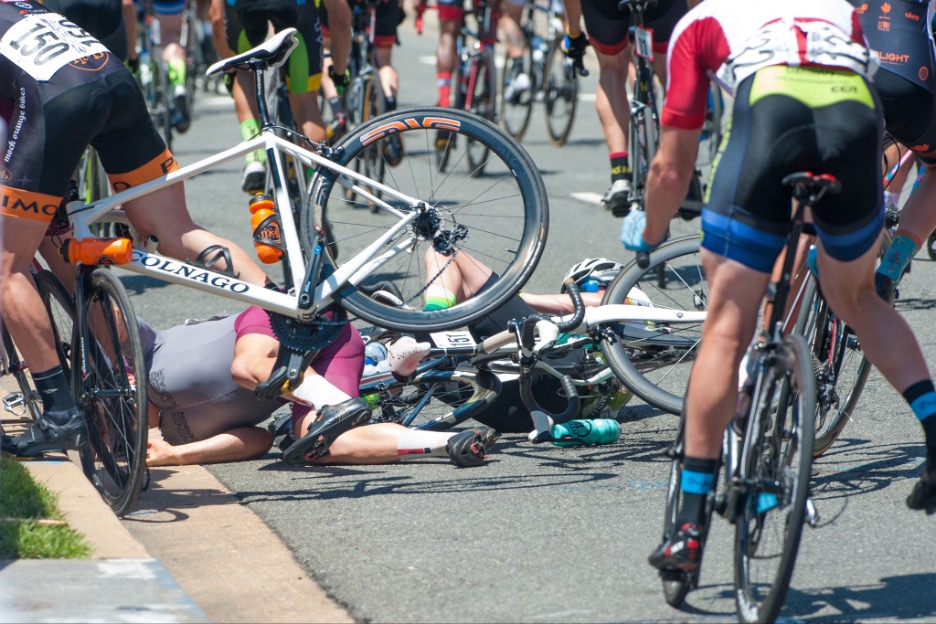
Prompt Images
Crashing is not something people usually think of as desirable; it can be traumatic and frightening, and we can get injured, sometimes badly. We like to think we are safe drivers, safe cyclists, safe skiers: it probably won’t happen to me.
Sometimes, however, bad things do happen: Life has a way of delivering unexpected and sometimes adverse events, upsetting our carefully laid plans. Perhaps an animal runs across the road; perhaps the weather turns unexpectedly; perhaps someone reacts suddenly in a way we can’t predict. We like to think we are in control, but as life often enjoys reminding us, of course we are not.
Crashing my bike was not in my training plan last year, but somehow I hit the jackpot with three of them.
I’d decided to try bicycle road racing after falling in love with practice racing during the pandemic. I couldn’t get enough of the speed, the split-second tactical decision-making, and the adrenaline rush. I considered myself a strong rider and decent bike handler—I hadn’t crashed in at least 10 years, so I wasn’t thinking about crashing when I signed up for my first real races. To have three consecutive cycling crashes was not only surprising and humbling, it forced me to look critically at myself and my goals and re-evaluate what I was doing, and what I hoped to achieve.
My first crash was relatively minor, luckily.
Two nearby riders touched wheels, sending someone down right in front of me. I couldn’t avoid them and found myself flying through the air, then rolling across the pavement. I got up with a ripped jersey and some ugly road rash, but I set my bike straight and hopped back on. I finished the race on adrenaline plus frustration, anger, and wounded pride at being unseated and scraped up. I managed to pull off a respectable finish, bleeding and torn, despite being delayed and separated from the lead pack.
The second crash was more severe.
I tore three ligaments in my shoulder. This happened at a bigger and more serious race where I was intimidated by the more experienced competition and hoped I could just make a decent showing. As the race geared up, all the cyclists were getting familiar with the course and other racers, wondering who was going to make a break and how. That’s when I heard a shriek and saw bikes flying up into the air in front of me. I have no idea what happened next. I found myself on the pavement next to someone groaning and bleeding. I was able to get up and shook myself off, taking inventory of my body: more road rash and a bit of shoulder pain, but I felt I’d be able to continue on the way I had before, in the previous race. I picked my bike up, however, to find it was inoperable—the chain was jammed and couldn’t be freed without disassembly.
I sat in the middle of the road with my nonfunctional bike, dejected and waiting for help to arrive. As I sat, the evaporating adrenaline allowed me to feel the growing pain and swelling in my shoulder, and I realized I’d been injured more seriously than I’d thought, so it was actually a blessing my bike was inoperable. That injury to my shoulder AC joint took me off the road for six weeks, and, nine months later, I am still working back to full strength, minus those three ligaments.
The third crash was completely avoidable, the result of trying to get back on the road too quickly.
Riding casually with friends only six weeks later, I encountered some rough pavement and my front wheel destabilized. My shoulder, still healing, didn’t have the strength to right my wheel and recover my balance. I went down. Banged up and shaken, this third crash earned me even more frustrating time off, though of course I was grateful to avoid more serious injury this time.
The thing about crashing is, it’s freaking scary.
One minute all is well; the next minute you’re flying through the air, wondering what the hell happened and hoping desperately that somehow things won’t end badly.
Crashing is traumatizing to both mind and body: it creates fear. Fear is a powerful motivator, and can be crippling if you allow it to take over. I became more and more fearful after each subsequent crash. As the fear became more expansive and entrenched, attacking my confidence, I began to understand that I’d need to figure out how I was going to address it. If instead I avoided it, the fear would incapacitate me.
The old adage of getting back up on the horse when you fall off is a useful one.
You definitely need to get back to what you were doing before too much time passes. I was certainly afraid of riding again, even though it’s something I passionately love. The degree of my passion for cycling, however, allowed me to confront my fear in a way that would have been difficult in other circumstances or with other sports. I love cycling so darned much, I just wasn’t willing to let my fear of crashing keep me from doing it. I had to find a way of dealing with this fear. And in doing this, I learned something invaluable.
Finding a quiet space, I shut out all distractions and sat with myself. I asked myself: Are you going to give up something you love so much? Are you going to capitulate, to fold your hand and live small? Are you going to let fear win?
Or are you going to turn this fear into something you can use?
As I sat with myself and thought about these things, another path forward began to emerge.
I had one last race on my schedule that I’d been terrified of for months: The Mt. Washington Auto Road Bicycle Hillclimb. This is a notoriously tough race: the hardest, steepest hill climb in the Northeast. My confidence in my ability to do this race had, for the past six months, ranged from “yes, I think I probably can” to “hmmm, maybe” to “what the hell am I thinking?” However, it was the last race on my calendar, and after all these darned crashes, I was determined to compete and have a good day mentally even if I blew up and had to walk my bike up the mountain.
I decided this race would not be about any kind of outcome; it would be about my strength and tenacity. Whatever the hell happened, I decided I was going to stick it out and not quit.
The morning of this grueling race dawned sunny and beautiful; it was going to be unusually, unbelievably pleasant riding up this mountain known for having the Worst Weather in the World. Luck, perhaps, was finally with me for a change. I arrived wearing what was for me a good luck talisman: I’d sewed up the holes in my first crashed-out jersey and wore it proudly, determinedly, as a reminder to myself of what I’d been through and survived. If I could bounce back from these recent crashes, one with a major injury, and give the mountain everything I had, well, that was exactly what I came to do.
That whole brutal race, I drew on my toughness, my anger, my outrage, my determination not to quit.
I gave the birdie to my fear: Screw you, Fear. Not this time. You have no place here. This is a war of attrition, and I’m gonna outlast you. Watch me flip you off in the rear view mirror, pal.
I only looked forward, up the mountain, and refused to let anything or anyone get in the way of that tough, obstinate mindset I’d created for myself. I told my ego to take a back seat and I focused everything I had on what my body was doing, how it was feeling, what it needed, and the job I had to do. Don’t stop. Keep going.
And… it worked.
I discovered that not only could I do a brutal hill climb race like that, I could do it well. That take-no-prisoners mindset, that refusal to give up, propelled me to a first place finish in my age group. More than ten minutes ahead of the next person.
All those crashes wound up being a huge asset to me; they allowed me to understand myself better and use my strengths in a way I would not have been able to had I never crashed.
Crashing, then, has actually made me a better, tougher, smarter, more motivated rider. Because I didn’t back down. Because I sat with my fear, and figured out how to harness it, to use it to my advantage.
Crashing, or any adverse and unexpected event for that matter, does not necessarily have to be a “bad” thing. Instead it can be beneficial, a catalyst for growth and achievement. When bad stuff happens, when scary stuff happens, don’t ever back down. Don’t give up. Adversity is where the money is. Adversity can change your life for the better, if you allow it to.
What will you do the next time life throws you something unexpected and challenging? You’re not beaten unless you want to be. What will you do with what you’re given? It’s your choice.



